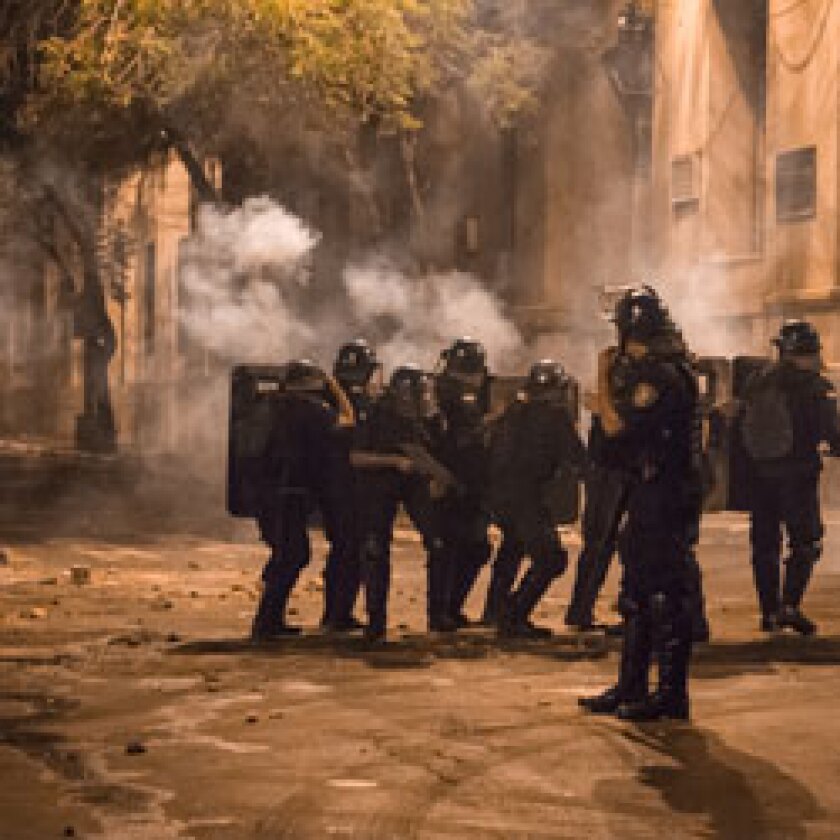
Financial leaders gathered in Paraguay for the IDB meetings rallied behind the host country’s government on Saturday after violent demonstrators swept through the capital Asunción, setting fire to the parliament and engaging in battles with police that left one person dead. But bankers at the meeting warned privately that the violence and sense of political crisis could damage the country’s reputation among investors, while protestors told Global Markets they feared the country was returning to dictatorship.
Dyogo Oliveira, Brazil’s planning minister, said the protests did not “justify a greater concern. It is a domestic issue. Paraguay has the means to resolve this in a pacific way. They will find their way within the institutional framework”.
Protests erupted on Friday night, with demonstrators setting fire to Congress amid a popular uprising against the government’s plan for a constitutional change that would allow the president to stand for re-election.
Fires dotted streets throughout downtown Asunción late into the night. The police responded with mounted officers and water cannons, using rubber bullets and dispersing crowds with teargas. One protester was killed during a police raid on the headquarters of the opposition Liberal party and dozens were injured.
The protests, which had been building for a week, grew violent after the Senate voted by a slim margin to remove the first hurdle for President Horacio Cartes to run for a second five-year term in April 2018.
The government insisted that the violence was “political noise” that arose every five years in the run-up to elections. “We are very saddened by what is happening, but it is usual politics,” said Lea Gimenez, deputy minister for state economic affairs, at a forum the day after protests. “There is a strong disconnect between the political side and the economic side.”
Privately, the opinion was different, with bankers and analysts attending the IDB shaking their heads about the turn of events. Graham Stock, sovereign strategist at Bluebay Asset Management, said the political turbulence was “not a surprise, although it is particularly ill-timed”, adding that the reason Paraguay was not investment grade was because of the political risks and institutional concerns with the country.
“For bondholders, the important issue is whether it affects economic policy. That will be determined by the resulting election, rather than the referendum on whether to allow a second term,” he said.
One local banker said: “This looks bad, regardless of the spin the government want to “This looks bad, regardless of the spin the government want to put on it,” said a local banker. “It is even worse coming on the heals of constitutional crisis in Venezuela.”
Last week Venezuela’s Supreme Court stripped the Congress of its powers, effectively giving full control of the country to President Nicolás Maduro. That decision is under review after Maduro made a public speech, appealing to the court to reverse its ruling.
Protestors fear ‘coup’
Protesters outside Paraguay’s Congress drew parallels to what was happening in Venezuela. “Maduro is an idiot, but at least he had the courage to face the public. Here, Cartes is afraid to face Paraguayans. He has created this situation, pitting Paraguayans against each other just because he wants to stay in power,” said Arsenio Delgado, a small business owner.
Others said they saw the move as “coup” that would put Paraguay on a track towards dictatorship. “We are here because Paraguay faces grave danger. We risk returning to a dictatorship and losing everything that was fought for in the past 25 years,” said Carlos González, a student, told Global Markets in front of the burning congressional building.
Ezequiel Rodríguez, a teacher, said the country’s democracy was still young and feared that the legislative process could lead to greater problems.
“We have never experienced this. I was a student during the fight for democracy in the 1980s and this is different. The authorities say this is part of the democratic process, but that is not the impression people get,” he said.
In a statement, President Cortes condemned the violence and said the legislative process was part of the country’s democracy. Paraguay returned to the democratic fold in 1992.
IDB president Luis Alberto Moreno expressed his solidarity with friends and family of those affected by Friday night’s incidents. "In our region, many countries have experienced conflicts like the one Paraguay is living through at the moment. But we must remember from our history that democracy is a process that, by definition, includes the debate of ideas."
The constitutional change still requires approval by the lower house in Congress, which is controlled by Cartes’ Partido Colorado. If that happens, it would trigger a national referendum within 60 days that would give the voters the opportunity to reject or approve the measure.
Paraguay is the only South American country that does not allow for any kind of presidential re-election. The modification would also allow former president Fernando Lugo to run. Lugo, a former Catholic bishop, was elected in 2008, but impeached in 2012, a year before his term ended. He is a senator and voted for the constitution amendment.
